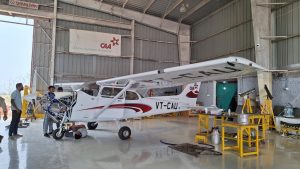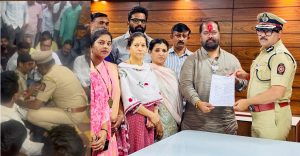Former Tanzanian President Praises Rajasthan Government’s Efforts on Dakshata
New Delhi : Former President of Tanzania Jakaya Mrisho Kikwete, also a well-known maternal and newborn advocate, is on a four-day visit to India. Mr. Kikwete is here to see how on-ground challenges are being tackled to ensure that pregnant women give birth safely in a health facility with qualified personnel include transport, staff, equipment, medical supplies, and infrastructure; an area where India in last few years has been making rapid strides.
Former President of Tanzania Jakaya Mrisho Kikwete, also a well-known maternal and newborn advocate, is on a four-day visit to India. Mr. Kikwete is here to see how on-ground challenges are being tackled to ensure that pregnant women give birth safely in a health facility with qualified personnel include transport, staff, equipment, medical supplies, and infrastructure; an area where India in last few years has been making rapid strides.
Mr. Kikwete visited the Dakshata program empowering providers for Improved Maternal & Neonatal Healthcare Care (MNH) in Rajasthan, that has succeeded in arresting and reversing the high neonatal births in the state. This initiative of the government of India aims to improve the quality of care at healthcare delivery points across the country. In Rajasthan, the intervention has succeeded in empowering health workers, creating an enabling environment for them to perform their duties; it has also prioritized and standardized approaches for life-saving practices at the point of use. This highly successful scheme (modeled on the WHO Safe Childbirth Checklist, implemented in 147 facilities across seven high priority districts in the state) came in for high praise from the former President.
‘Dakshata’ may find mention at the UNGA
During his visit to Rajasthan, Mr. Kikwete also met the minister of Health Shri. Kali Charan Sarafand congratulated the Smt. Vasundhara Raje led Rajasthan government for the ‘impressive’ work done under ‘Dakshata’. He also stated that he would certainly make a prominent mention of the same in his address to the United Nations General Assembly (UNGA) later this year on how India and the Rajasthan model of on-ground implementation of Dakshata can become the role model for other developing countries, especially from the African continent to learn and replicate.
“Visiting two facilities during my visit to Rajasthan, I was struck by the way this program is being run so efficiently and diligently. I commend the Rajasthan Government in making this a highly successful program which has overhauled the neonatal care scenario in this state. This is a successful approach to showcase that a strong political will combined with an innovative approach can make a significant improvement in maternal and newborn health outcomes,” remarked former President Kikwete.
“Focus on initiatives to empower children and women, worthy of emulation,” says former President
Mr. Kikwete was also apprised of various schemes run by the Rajasthan Government such as Bhamashah Yojana, Mukhyamantri Rajshree Yojana, Mukhyamantri Jal Swavalamban Abhiyan, Chirayu Programme etc. Mr. Kikwete noted how schemes and policies run by Smt. Raje’s Government are empowering communities and helping to change the status quo of women and the girl child in her state.The ‘Poshan’ program of the Government of Rajasthan which addresses the issue of malnutrition was also discussed as an example of how state support along with the right kind of interventions can make a huge difference on the ground which is worthy of emulation in other parts of the world.
Mr. Kikwete on his visit to Delhi also met Smt. Maneka Sanjay Gandhi, Union Minister for Women and Child Development and discussed issues and solutions around maternal and child care between both countries.
His Excellency expressed his gratitude for the warmth and cordiality people of India and the state of Rajasthan had extended to him during his visit and mentioned that “Dakshata” program should be something India should showcase to the world and share best practices for other countries struggling in this space to emulate.







